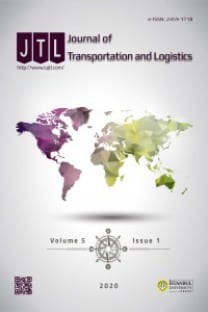Veri Zarflama Analizini Yöntemi Kullanarak Su Distribütörlerinin Etkinliğinin Ölçümlenmesi
Bu araştırmanın amacı, bir su fabrikasının 51 tane dağıtıcısının 2012 ve 2013 yılları arasındaki verilerini 5 farklı değişken (satışlar, personel sayısı, firma ile dağıtıcı arasındaki uzaklık, depo büyüklüğü ve diğer kuruluş maliyetleri) yardımıyla Veri Zarflama Analizi yöntemi (VZA) kullanarak dağıtıcıların etkinliğini ve verimliliği değerlendirmektir. Analizden sonra ilk varsayımlardan farklı sonuçlar aldık. Büyük şehirlerin distribütörlerinin verimliliği küçük şehirlerden ve kasaba distribütörlerinden daha iyi olduğu sonucuna varıldı. Küresel çatışma, Suriye’deki savaş, Türk hükümeti politikaları, savaş mültecilerini kabul etme ve diğer doğal ve çevresel nedenlerden dolayı 2012 ve 2013 yılları seçildi. Analiz sonuçlarına göre dağıtıcıların yöneticilerine etkinliklerini ve verimliliklerini artırıcı bazı önerilerde bulunuldu.
Anahtar Kelimeler:
Data envelopment analysis, Productivity analysis, Malmquist index, Efficiency change, Total factor productivity
Using Data Envelopment Analysis for Measuring the Efficiency of Water Bottling Distributors
The purpose of this research is to assess the efficiency and productivity of 51 water bottling distributors based on DEA (Data Envelopment Analysis) approaches that were evaluated between 2012 and 2013, as per 5 variables, these being sales, staff, distance, size, and capex. We got different results from the initial assumptions after the analysis. Big cities distributors’ efficiencies are better than the small cities and town distributors. The time period was selected because of the global conflict, war in Syria, Turkish government policies, accepting the war refugees and the other reasons, natural and environmental. According to the research results, some suggestions have been made for the managers of the distributors.
Keywords:
Data envelopment analysis, Productivity analysis, Malmquist index, Efficiency change, Total factor productivity,
___
- Bigne, E., & Blesa, A. (2003). Market orientation, trust and satisfaction in dyadic relationships: a manufacturerretailer analysis. International Journal of Retail & Distribution Management, 31(11), 574-590.
- Chen, F. Y., Wang, T., & Xu, T. Z. (2005). Integrated inventory replenishment and temporal shipment consolidation: A comparison of quantity-based and time-based models. Annals of Operations Research, 135(1), 197-210.
- Cooper, W. W. (2007). Seiford. LM and Tone, K.(2000) Data Envelopment Analysis: A Comprehensive Text with Models, Applications, References and DEA-Solver Software.
- Cooper, W. W. vd.(2000),“Data Envelopment Analysis: A Comprehensive Text with Models, Applications, References and DEASolver Software”.
- Cooper, W. W., Seiford, L. M., & Zhu, J. (2011). Data envelopment analysis: History, models, and interpretations. In Handbook on data envelopment analysis (pp. 1-39). Springer, Boston, MA.
- Cooper, W. W., Seiford, L. M., & Zhu, J. (2011). Data envelopment analysis: History, models, and interpretations. In Handbook on data envelopment analysis (pp. 1-39). Springer, Boston, MA.
- De Souza, M. M. M. &. F., April-June 2010. ‘Performance of Brazilian supermarket companies: a Data Envelopment Analysis approach/Desempenho organizacional setor supermercadista. Faculdade de Economia, Administracao e Contabilidade, 17(2), pp. p151, 17.
- Diaz-Balteiro, L., Herruzo, A. C., Martinez, M., & González-Pachón, J. (2006). An analysis of productive efficiency and innovation activity using DEA: An application to Spain’s wood-based industry. Forest Policy and Economics, 8(7), 762-773.
- Emrouznejad, A., 2012. www.deazone.com. [Online] Available at: http://deazone.com/en/cooper-framework/ cooperframework-phase4 [Accessed 06 03 2018].
- Fare, R., Grosskopf, S., & Lovell, C. (1993). Frontmatter. In Production Frontiers (pp. I-Viii). Cambridge: Cambridge University Press.
- Farrell, M., 1957. The Measurement of Productive Efficiency. Journal of the Royal Statistical Society, 3(1), pp. 253-290 .
- Favero, C. A., & Papi, L. (1995). Technical efficiency and scale efficiency in the Italian banking sector: a non-parametric approach. Applied economics, 27(4), 385-395.
- Ross, A., & Droge, C. (2002). An integrated benchmarking approach to distribution center performance using DEA modeling. Journal of Operations Management, 20(1), 19-32.
- Dos Santos, R. F., Marins, F. A. S., Alves, J. M., & Moellmann, A. H. (2010). A real application of the theory of constraints to supply chain management in Brazil. Brazilian Journal of Operations & Production Management, 7(2), 81-100.
- Seiford, L. M., & Thrall, R. M. (1990). Recent developments in DEA: the mathematical programming approach to frontier analysis. Journal of econometrics, 46(1-2), 7-38.
- Walden, J., & Kirkley, J. E. (2000). Measuring technical efficiency and capacity in fisheries by data envelopment analysis using the General Algebraic Modeling System (GAMS): A workbook. US Department of Commerce, National Oceanic and Atmospheric Administration, National Marine Fisheries Service, Northeast Region, Northeast Fisheries Science Center.
- William W. Cooper, L. M. S. a. J. Z., 2005. History, Models and Interpretations. DATA ENVELOPMENT ANALYSIS, XIII(8), p. 1266.
- Başlangıç: 2015
- Yayıncı: İstanbul Üniversitesi
Sayıdaki Diğer Makaleler
Veri Zarflama Analizini Yöntemi Kullanarak Su Distribütörlerinin Etkinliğinin Ölçümlenmesi
Konteyner Taşımacılık Şirketlerinin Rekabet Düzeyini Ölçen Yeni İndeksler
Ahmet Selçuk BAŞARICI, Tanzer SATIR
Güvenli Ulaşım Bakış Açısıyla Bir Kayıcı Teknenin Yalpa Hareketi İçin Kontrolcü Dizayni
